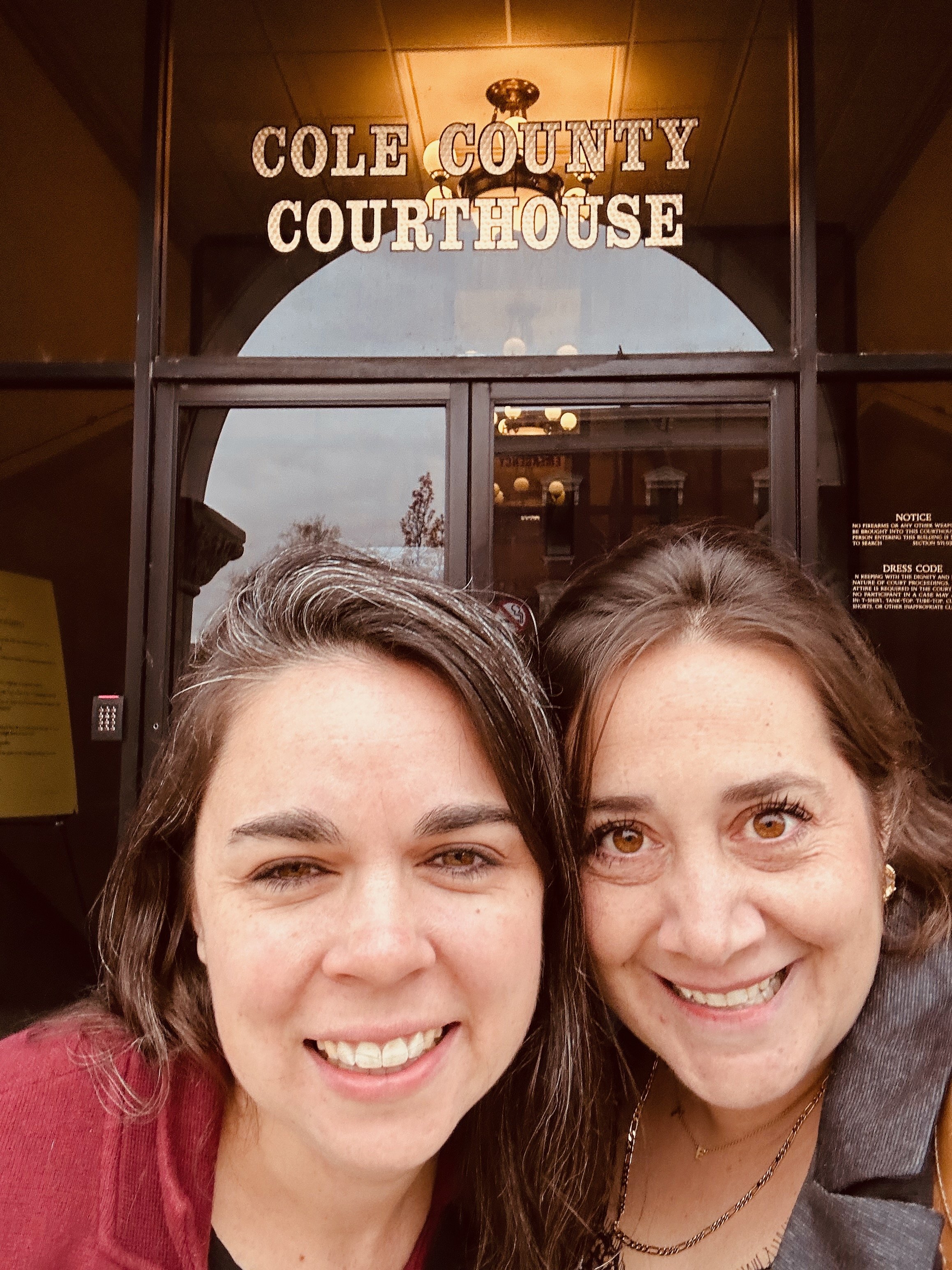Trial over Missouri’s new voter photo ID law begins in Jefferson City
Check out this article from the St. Louis Post Dispatch:
By Jack Suntrup; Nov 17, 2023
Christine Dragonette, Director of Social Ministry at St. Francis Xavier College Church, and Sara Ruiz, Executive Director of the Ashrei Foundation, were called to testify as expert witnesses on Friday, Nov. 17, 2023 - the first individuals to take the stand in this historic lawsuit. (Photo: Sara Ruiz)
JEFFERSON CITY — A challenge to a new photo ID requirement for Missouri voters focused Friday on the difficulty some residents have in obtaining the necessary records.
In the first day of testimony in a Cole County courtroom, lawyers for plaintiffs in the case questioned witness Sara Ruiz, director of St. Louis-based Ashrei Foundation. The group’s North City Photo ID Project helps people obtain IDs.
Ruiz said that in her role, it was “shocking to me” how cumbersome it was to obtain Missouri IDs and underlying documents such as birth certificates.
She recalled a client whose vehicle had allegedly been stolen “and had nothing,” including no photo ID.
The director said the woman was borrowing a friend’s cellphone, that she had recently relocated from Philadelphia, and that her family’s phone numbers were on her cellphone, which had been stolen with her vehicle.
State lawyers objected to the account, calling it hearsay, but Cole County Presiding Judge Jon Beetem overruled the motion.
Ruiz said for the woman to obtain a birth certificate, she needed a photo ID, or, alternatively, two documents with her name on them.
“Coming up with two things with your name on it when you don’t have any possessions at all is really challenging,” Ruiz said.
The Missouri League of Women Voters, NAACP and three voters are suing to overturn the law.
Plaintiffs initially challenged the law last year, arguing the new law made casting ballots unconstitutionally difficult for some voters.
Beetem dismissed the previous case in October 2022, finding neither of the two voter plaintiffs then “alleged a specific, concrete, non-speculative injury or legally protectable interest in challenging the photo ID requirement.”
The Missouri ACLU and Missouri Voter Protection Coalition, who sued on behalf of the plaintiffs, have since added another voter to the lawsuit and asked Beetem again to find the voter ID requirement unconstitutional.
The new law requires voters to show photo identification to cast a regular ballot.
People without a government-issued photo ID can cast provisional ballots to be counted if they return later that day with a photo ID or if election officials verify their signatures.
The law requires the state to provide a free photo identification card to those lacking one to vote.
The newest plaintiff in the case is John O’Connor, a 90-year-old Columbia, Missouri, resident with poor vision who needs help walking. When the law took effect last year, O’Connor had an expired passport and driver’s license, which are not acceptable forms of identification to vote under state law.
His lawyers argued he eventually obtained a non-driver’s license with the help of his wife, but only because officials accepted his expired driver’s license despite guidance from the state Revenue Department that long-expired licenses are not acceptable records to use when seeking new IDs.
“Even when a voter obtains the underlying documentation, voters who lack transportation, cannot get to the DMV or other government agencies during their hours of operation, or have a disability or impairment that prevents them from accessing a DMV, the voter is still unable to surmount the burdens to obtaining a photo ID,” the plaintiffs’ lawyers wrote in a pretrial brief.
Republican Attorney General Andrew Bailey’s office is defending the law in court. The state lawyers argue that, so far, no one has been turned away at the polls because of the law.
Missouri provides free non-driver’s licenses for voting to those who do not already have a driver’s license or have a current license. The health department’s Bureau of Vital Records provides free birth certificates to those seeking their first non-driver’s license in order to vote if the applicant does not have a current driver’s license.
“There is not a severe burden on the right to vote as the State has gone to great lengths to help voters obtain IDs,” Bailey wrote in a court brief.
The trial was scheduled to continue next week on Monday, Tuesday and Wednesday.
The Associated Press contributed to this report.
Click here for a PDF version of this article.

